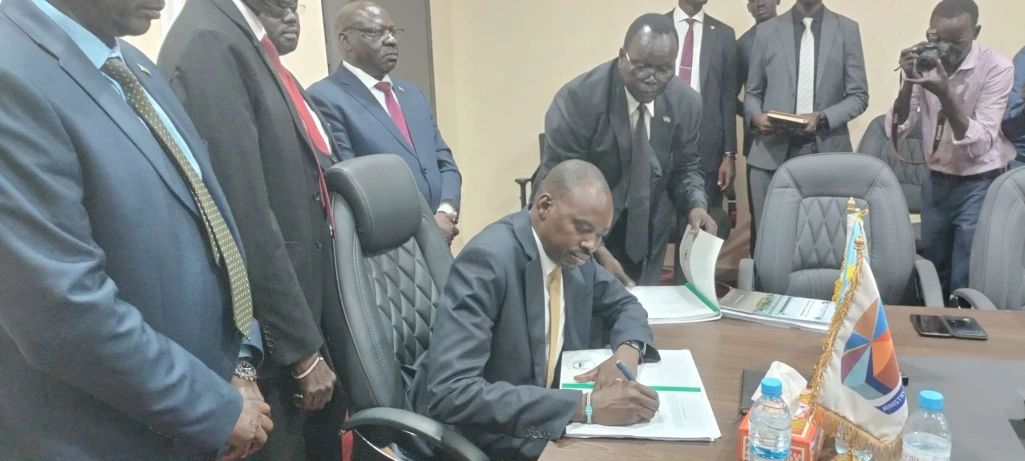
In a move to enhance transparency and accountability in South Sudan's financial systems, the Minister of Finance and Planning, Dr. Marial Dongrin Ater, has signed into law the Public Procurement and Disposal of Assets Regulations.
Signed on Thursday, the new legislation aims to curb the misappropriation of public funds and address the country's long-standing challenges with resource mismanagement.
“This is one of the key 11 areas the government has been working on. Today is a great day as we conclude the legal framework for the operationalization of Public Procurement and Disposal of Assets in South Sudan,” Dongrin announced.
He emphasized the importance of the regulation in promoting financial transparency.
“The people of South Sudan expect the country’s resources to be spent transparently, with no wastage. I assure you, we have come a long way, and the government is committed to helping you discharge this important mandate,” he told the authority.
The new procurement laws are part of broader public finance management reforms aimed at tackling the rampant corruption and inefficient use of resources that have plagued South Sudan’s governance.
Historically, public procurement has been a major area of concern, with weak financial controls leading to widespread misuse of funds. The new regulations seek to close loopholes by establishing strict guidelines for procurement and asset disposal, a key step toward improving governance and resource allocation.
Ayii Bol Akol, Chairperson of the Board of Directors of the Public Procurement and Disposal of Assets Authority (PPDAA), outlined the long path to enacting the legislation.
“This process began in 2021, with a validation workshop in 2022 and the formation of our board in 2023. Signing this regulation signifies the start of the procurement reform agenda. Despite limited resources, we are committed to achieving value for money,” said Bol.
The World Bank has underscored the significance of transparent procurement practices in fostering government-citizen trust and guaranteeing the allocation of public resources to crucial sectors such as healthcare, education, and infrastructure.
Juvenal Nzambimana, Acting Country Manager of the World Bank South Sudan Office, praised the move as a “milestone” for the country.
“The operationalization of this regulation is crucial for improving public finance management, governance, transparency, and accountability. South Sudan can now look forward to enhancing efficiency and integrity in its procurement processes,” Juvenal said.
This could help to address the country’s development challenges, improve service delivery, and ultimately foster greater trust in the government.
For the regulations to be effective, widespread public awareness and understanding are essential.
Minister Dongrin called on government bodies, including the PPDAA, to actively engage the public and ensure that citizens and officials alike are well informed about the new processes.
Dongrin stressed, "We expect the entire government to raise public awareness about the procedures so that these regulations guide us."
The successful implementation of the procurement laws promises a more efficient allocation of resources and a reduction in corruption in South Sudan.
With improved transparency in public spending, the government can channel more funds into key areas that directly benefit citizens.
In addition to improving governance, the new regulations are expected to boost investor confidence in South Sudan. Transparent and accountable procurement processes are essential for attracting investment, fostering economic growth, and creating more job opportunities. Investors are more likely to engage in a country where financial processes are clear and trustworthy.
While challenges remain in fully implementing and enforcing the new regulations, the signing of the Public Procurement and Disposal of Assets law represents a step toward a more accountable and transparent financial system in South Sudan.
By closing gaps that have allowed corruption and wasteful spending to thrive, the government is moving toward better governance and improved public services.